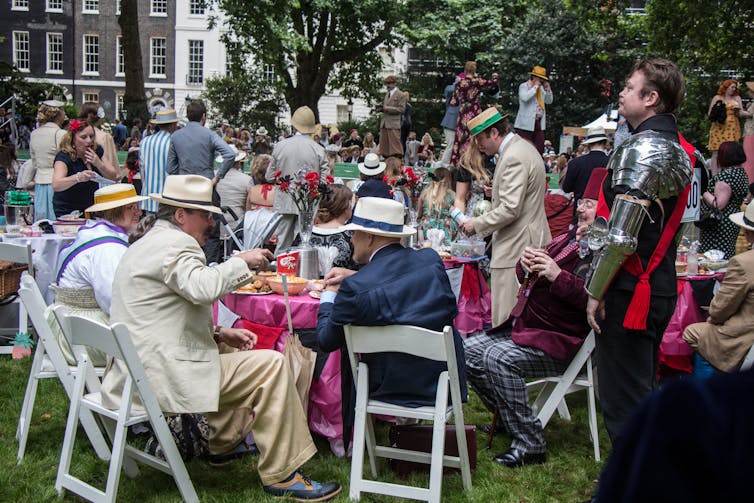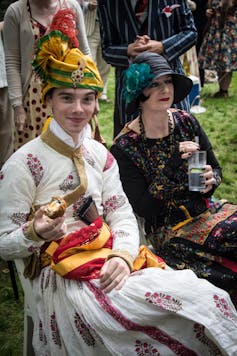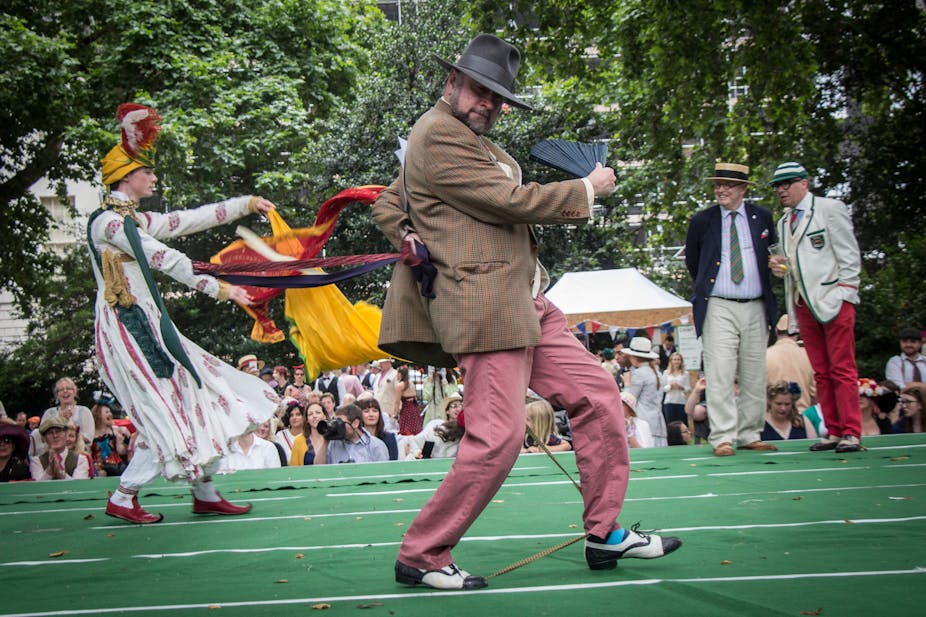Earlier this month, I attended the Chap Olympiad, an annual event which takes place in London’s Bedford Gardens. The brainchild of a handful of self-proclaimed eccentrics and writers associated with The Chap periodical, it has grown from a small gathering in a corner of Regent’s Park to something that now attracts international attention.
Combining a mixture of anti-sporting events, such as “umbrella jousting”, with a garden party atmosphere, the Olympiad encourages its attendees to dress and act in the cultured style of ladies, gentleman and dandies of all varieties. Celebrating British idiosyncrasies, and popular with those who favour a vintage look, the event is awash with pretty summer frocks, boating blazers, pith helmets and even, given the time of year, tweed in all its hues and patterns.
I have an academic fascination with aesthetic organisation, popular cultural events such as Christmas, and issues of embodiment, diversity and difference. And so my interest was stirred as to what the Olympiad might reflect, if anything, about the British psyche in a changing and increasingly uncertain geopolitical context.
Unsurprisingly, the wider media reaction to the event is polarised. For some, it celebrates all that is marvellous about British culture: well-groomed, respectful of its heritage, and not predisposed to taking matters too seriously. For others, it is simply a monocultural and unapologetic display of jingoistic posturing that glories in, to cite one critic, “your means dictating your status above others, stamping on the wrists of infant shoe shine boys and [getting] your cravat readjusted”.
In more ordinary times, such an event might appear somewhat trivial. These are not, however, ordinary times. For many, the Brexit vote appears to have reawakened dreams of Empire past and the idea that “Great” is once again a political, rather than a geographical, preface to Britain.
In tandem, a growing hostility to difference, especially when based on ethnic or national distinctions is increasingly manifest. This while, somewhat ironically, the idea that Britain can call on loyalties forged through the Commonwealth is providing a reassuring narrative for those still in denial about the possibility of Brexit causing economic damage.

What, therefore, might the popularity of an event such as the Olympiad represent under these circumstances? Does it simply reflect a desperate, and ultimately futile, nostalgia for times past? Or might it also signal something more optimistic about our character and culture, as we steam away from our continental partners?
Camping for Chaps
One can’t deny that the Olympiad caters to a sizeable constituency of patrons who wave their Union flags and guffaw with a little too much sincerity, or for whom a return to “traditional values” means more than simply reviving standards of courtesy and decorum. Nor, among the vintage glamour, does the event entirely eschew moments more akin to a Carry On film – as young women in nurses’ costumes administer reviving cocktails to fallen competitors.
Yet, at the same time, one should be cautious about indiscriminately identifying the event and all its participants with its less agreeable elements. Speak to many, and they will tell a different story. For them, this is an opportunity not only to celebrate the more endearing, if increasingly marginalised, aspects of our national character – most notably a light-hearted celebration of sporting ineptitude and a Noel Cowardesque sense of the absurd. It is also about enjoying an alternative set of manners and conventions to those characteristic of an increasingly alienating culture of disposability, arrogance and incivility.

There is also a highly subversive element at play here. While most attendees at the Olympiad – male, female and indeed transgendered – predominantly favour dress and behaviour that echoes the styles of the privileged, this is a mimetic exercise that is often profoundly camp in both its form and content. Something that, as feminist thinkers such as Susan Sontag once observed, often unsettles and undermines the very stability and legitimacy of those practices it references.
Reasons to be cheerful?
In the end, however, can an event that appears to both reinforce nostalgia for “Little Britain” while at the same time caricaturing and subverting it, tell us anything in the age of Brexit? Or might this be placing too great a burden on its shoulders when, after all, it’s all just supposed to be a bit of fun?
Well, perhaps it might offer some cause for optimism. That certainly appears to be the belief of both its organisers and many who attend it. For as the day wore on, it became increasingly clear that, overall, there is indeed a warm and inclusive ideal at the heart of the Olympiad. One that brings imaginatively dressed people of all ages, gender identities, sexualities, and ethnic backgrounds together to not only celebrate, but also to gently and good-humouredly mock, and often subvert, a series of cultural shibboleths.
I will miss the EU, but if an event such as this reminds us that at its best, Britain can still be a generous, welcoming and even fun place to be, then there remains room for optimism.

